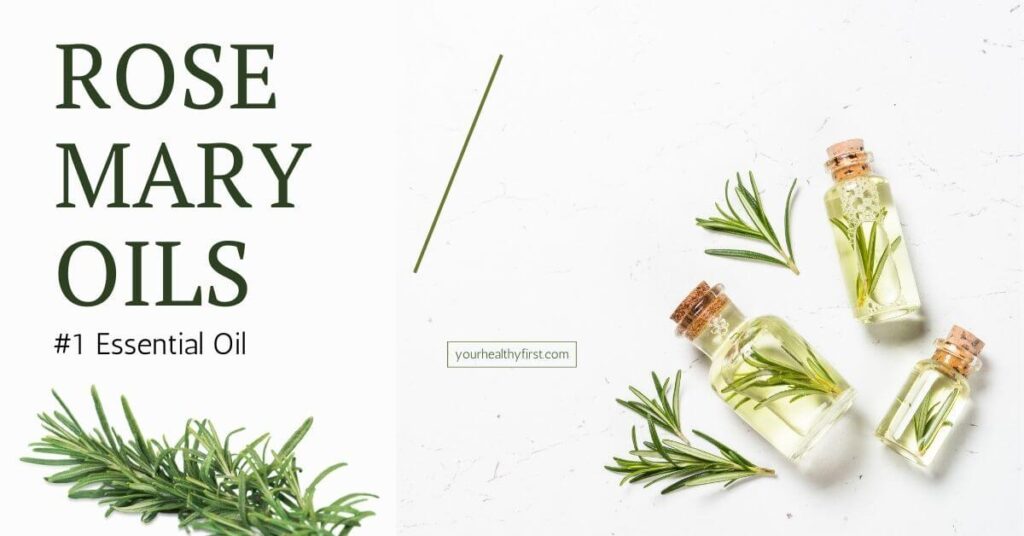This article includes affiliate links, which means I might receive a commission if you decide to buy something through them. It won’t cost you anything, but your support helps me keep creating helpful content like this. Thank you!
Introduction
Rosemary essential oil is a powerful and versatile natural remedy used for centuries to enhance mental and physical health. Its fresh, herbal scent offers benefits ranging from improving cognitive function to promoting hair growth. Whether you’re a seasoned essential oil user or new to aromatherapy, incorporating rosemary essential oil into your daily routine can offer numerous health and wellness advantages.

Ingredients
Rosemary essential oil is typically steam-distilled from the fresh flowering tops of the Rosmarinus officinalis plant, which is native to the Mediterranean region. The key active compounds include:
- 1,8-Cineole: Known for its anti-inflammatory, antimicrobial, and antioxidant properties.
- Camphor: Provides a warming sensation and helps soothe muscle aches and pains.
- α-Pinene: A compound that supports respiratory health and mental clarity.
- Verbenone: Known for its regenerative properties, especially for skin and hair.
Benefits of Rosemary Essential Oil
- Hair Growth: Rosemary essential oil has been traditionally used to promote hair growth and improve scalp health. Its stimulating properties may increase blood flow to the scalp, which can help nourish hair follicles and encourage hair growth. Additionally, it may help reduce dandruff and maintain overall scalp health due to its antimicrobial properties.
- Cognitive Function: Rosemary essential oil is known for its potential to enhance memory and concentration. Studies suggest that inhaling rosemary oil may improve cognitive performance and increase alertness. This is attributed to its ability to stimulate blood circulation and support brain function, making it a great addition to study sessions or when working on tasks requiring focus.
- Stress Reduction: The aroma of rosemary essential oil can have calming effects on the mind, helping to reduce stress and anxiety. Diffusing the oil or adding it to a warm bath can create a soothing environment that promotes relaxation. This stress-relieving property is linked to the oil’s ability to lower cortisol levels in the body.
- Respiratory Health: Rosemary essential oil acts as an expectorant, helping to clear mucus and ease breathing. Its anti-inflammatory and antimicrobial properties soothe respiratory tract inflammation and combat infections. Inhaling its invigorating aroma enhances mental clarity, making it a valuable aid during cold and flu seasons.
- Muscle Relief: Rosemary essential oil provides muscle relief through its analgesic and anti-inflammatory properties, reducing soreness and swelling. It improves circulation, promoting faster recovery for tired muscles. Additionally, its calming aroma helps relieve stress, making it ideal for massages and relaxation after physical activity.
How to Incorporate Rosemary Essential Oil in Your Daily Routine
1. For Hair Care
Using rosemary essential oil can improve scalp health, promote hair growth, and prevent hair thinning. It’s especially effective for conditions like alopecia.
- Ingredients:
- 5 drops of rosemary essential oil
- 2 tablespoons of coconut oil (or another carrier oil like jojoba or almond oil)
- Instructions:
Mix 5 drops of rosemary oil with 2 tablespoons of oil. Gently rub the blend into your scalp, paying special attention to the areas where hair is thinning. Let it sit for a minimum of 30 minutes before washing your hair with a mild shampoo. To achieve optimal results, perform this routine two to three times per week.
2. For Mental Clarity
Enhance your focus and boost cognitive function with rosemary oil’s natural mental-stimulating properties.
- Ingredients:
- 3-5 drops of rosemary essential oil
- Carrier oil (optional) for topical use
- Instructions:
Add 3-5 drops of rosemary oil to a diffuser in your workspace or study area. A drop can be placed on your temples and wrists for an instant mental lift. If applying topically, dilute it with a carrier oil to avoid irritation.
3. For Stress Relief
Incorporate rosemary oil into your relaxation routine to help manage stress and anxiety naturally.
- Ingredients:
- 5-6 drops of rosemary essential oil
- Epsom salts or a carrier oil
- Instructions:
For a relaxing bath, add 5-6 drops of rosemary oil to a warm bath mixed with Epsom salts. If using for a massage, blend with a carrier oil and rub it onto your chest, neck, or feet for calming effects. Deeply inhale the aroma to enhance the relaxation process.
4. For Respiratory Health
Rosemary oil’s anti-inflammatory properties make it ideal for clearing sinuses and easing respiratory discomfort.
- Ingredients:
- 3-4 drops of rosemary essential oil
- Hot water for steam inhalation
- Instructions:
Boil water and pour it into a bowl. Add 3-4 drops of rosemary oil, place a towel over your head, and lean over the bowl. Inhale the steam for 5-10 minutes, breathing deeply to clear your sinuses and improve breathing.
5. For Muscle Pain
Rosemary oil can ease sore muscles, especially after physical exertion.
- Ingredients:
- 5 drops of rosemary essential oil
- 1 tablespoon of carrier oil (e.g., almond or olive oil)
- Instructions:
Mix 5 drops of rosemary essential oil with 1 tablespoon of a carrier oil and massage the mixture into sore or inflamed muscles. This method can help reduce pain, inflammation, and muscle stiffness. Use it after your workout or at the end of a tiring day.
Recommended Rosemary Essential Oil Products
- Artizen Rosemary Essential Oil: This 100% pure rosemary essential oil is ideal for aromatherapy, topical use, or adding to hair care products.
Check it on Amazon. - Majestic Pure Rosemary Oil: Known for hair growth and scalp health, this steam-distilled oil offers potent results for hair thinning or loss.
Check it on Amazon. - Cliganic USDA Organic Rosemary Essential Oil: Certified organic, perfect for diffusers, topical applications, or adding to homemade beauty treatments.
Check it on Amazon.
Why Rosemary Essential Oil is Beneficial for Daily Use
Rosemary essential oil is rich in compounds that can enhance overall well-being. Its anti-inflammatory, antimicrobial, and antioxidant properties make it a valuable asset for physical and mental health. By incorporating it into your daily routine, you can boost hair growth, improve mental clarity, and reduce stress, all while benefiting from its pleasant aroma. Regular use promotes a balanced and healthy lifestyle.
When to Use Rosemary Essential Oil
Rosemary essential oil can be used throughout the day, depending on your needs. Use it in the morning to boost concentration and focus, during the day for stress management, and after workouts to soothe sore muscles. It’s versatile enough to enhance both physical health and mental well-being at any time.
Conclusion
Incorporating rosemary essential oil into your daily routine offers a wide range of benefits, from enhancing hair growth and improving cognitive function to relieving stress and soothing muscle pain. Its versatility makes it a must-have natural remedy for promoting overall health and well-being. Whether used for aromatherapy, skincare, or hair care, rosemary essential oil can easily become a valuable part of your holistic wellness journey.
FAQs
1. Can I apply rosemary essential oil directly to my skin?
It’s recommended to dilute rosemary oil with a carrier oil before applying it to the skin to avoid irritation.
2. How often should I use rosemary oil for hair growth?
For optimal results, use rosemary oil 2-3 times a week in combination with a carrier oil.
3. Can rosemary oil improve memory?
Yes, rosemary oil has been shown to enhance memory and cognitive function, making it great for improving focus and mental clarity.
4. Is rosemary oil safe to use in a diffuser?
Yes, rosemary essential oil is perfectly safe to diffuse. It may enhance your mood and sharpen your mental focus.
5. Can I use rosemary oil for muscle pain?
Yes, rosemary oil, when applied topically with a carrier oil, can help soothe muscle pain and reduce inflammation.


